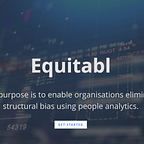Why ESG is trending now and how pay equity fits into it
We live in a highly volatile, uncertain, complex and ambiguous (VUCA) world right now. Ecological issues such as global warming, endangerment of sea and wildlife creatures, forest-fires, floods and hurricanes have been on the rise over the last few decades, grabbing people’s attention and raising awareness to act on climate change. Add social (poverty, famine, poor healthcare, child labour), political (war, religion, capitalisation of natural resources, power play between superpowers & unstable administrations) and economic (unemployment, inflation, discrimination, infrastructure, access to education, healthcare and career opportunities) issues to the mix and we’ve got people suffering everywhere. The more these issues come to light, the more people reflect on their ideologies and principles by which they live.
That includes anyone and everyone from consumers, shareholders, employees to businesses, organisations and governments.
A workforce perspective
Pre-COVID, the way things were done in any organisation, including our working lives and everything it stood for, were taken for granted as they were largely focused on hitting the next target, next business milestone, product growth etc. whereas every individual’s focus was on bonus, recognition, career progression etc.
The global uncertainties mentioned above, has particularly led the multigenerational workforce to question increasingly:
“What am I working towards?”
“What kind of an organisation am I working for?”
“What do my employers truly care about?”
Now more than ever, organisations need to think about what they truly stand for — beyond the corporate social responsibility, beyond just hiring “diverse” people to fill in quotas, to actually empower their workforce, while staying relevant in the market and remaining connected to their customers.
Through the investors lens
ESG is more than a buzzword. Anyone who has been following ESG trends, it’s strategies and reporting would have come across data supporting the fact that companies with higher ESG performance tend to create better financial returns. More and more investors have started investing their money where their values and principles align.
What does that actually mean? Money will be invested in businesses that ‘care’ about the social, political, economic and ecological issues. ESG investors seek to ensure the companies they fund are responsible stewards of the environment, good corporate citizens, and are led by accountable managers. They make socially responsible investments (SRI).
What this means for organisations
When the shareholders, customers and workforce alike are prioritising a value-based economy that puts sustainability at the center, it’s likely that governments across the world too do the same. It doesn’t make sense for organisations to not be socially responsible.
This is the decade where organisations become more purpose-driven, led by empathetic leaders who actually care about workforce happiness. The notion of fair and equitable workplaces is becoming a fundamental expectation for any employee joining the organisation.
Pay Equity
An organisation is deemed to be equitable when employees have fair and equal access to pay and opportunities for the same value of jobs they do. When employees figure out that they are paid ‘differently’ for the same job when compared with others (it could be because of their gender, race or ethnicity as opposed to relevant skills, experience and qualifications), they are going to line up for interviews elsewhere. I mean, if you were to be in the same shoes, would you choose very differently?
Not only does pay equity retain key talent, it builds trust and drives employee engagement. It gives an opportunity for organisations to activate a truly impactful DEI strategy and even improves a company’s ESG rating as the workforce happiness is improved.
Watch this space for more insights on all things pay equity, workforce analytics, talent retention and employee engagement.
